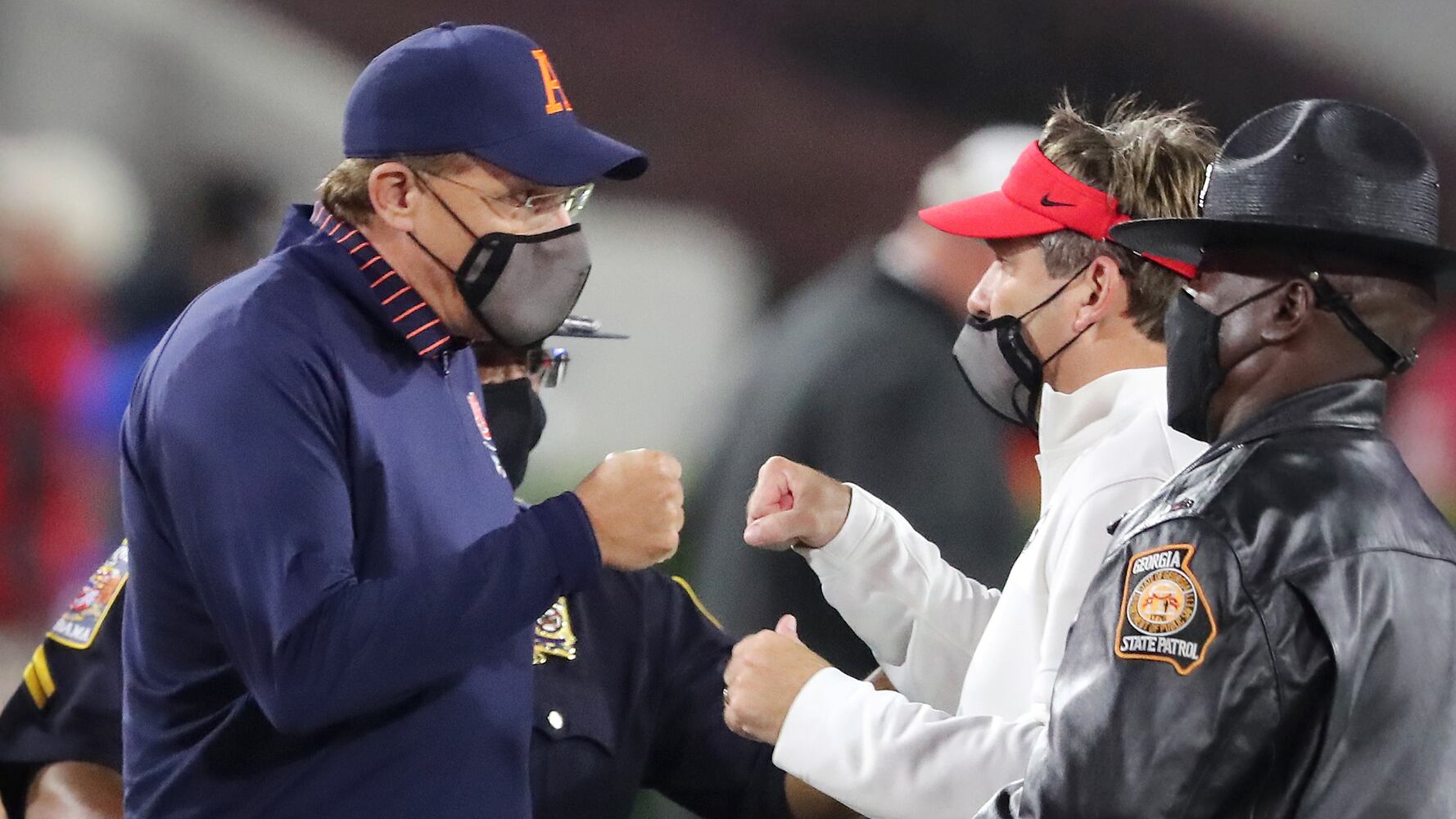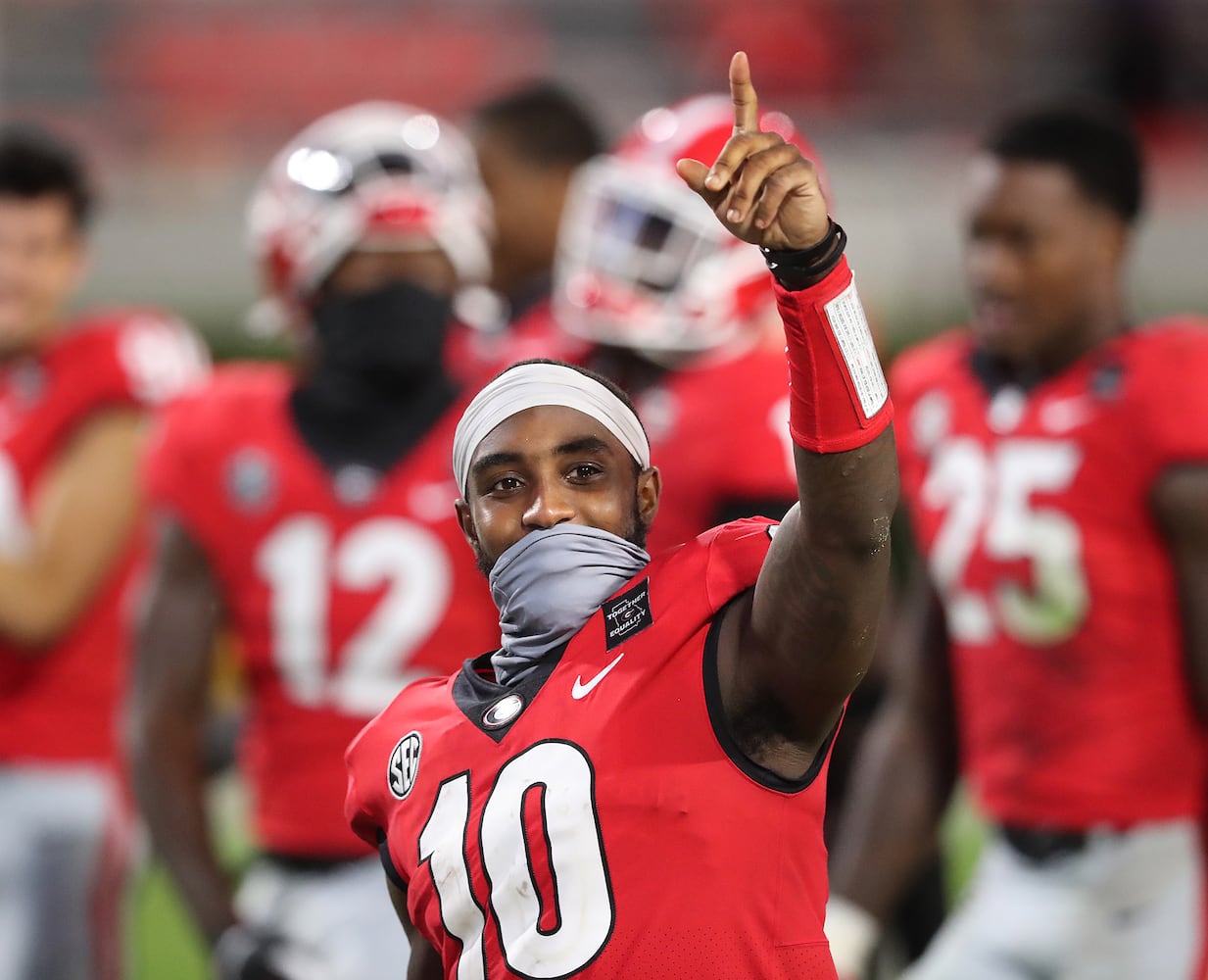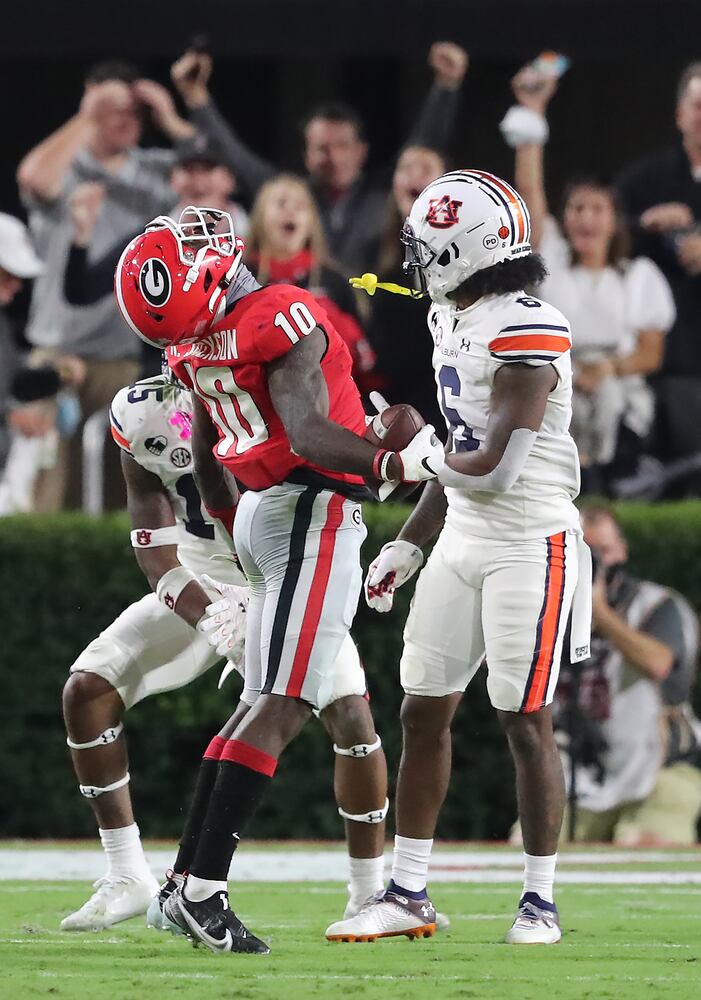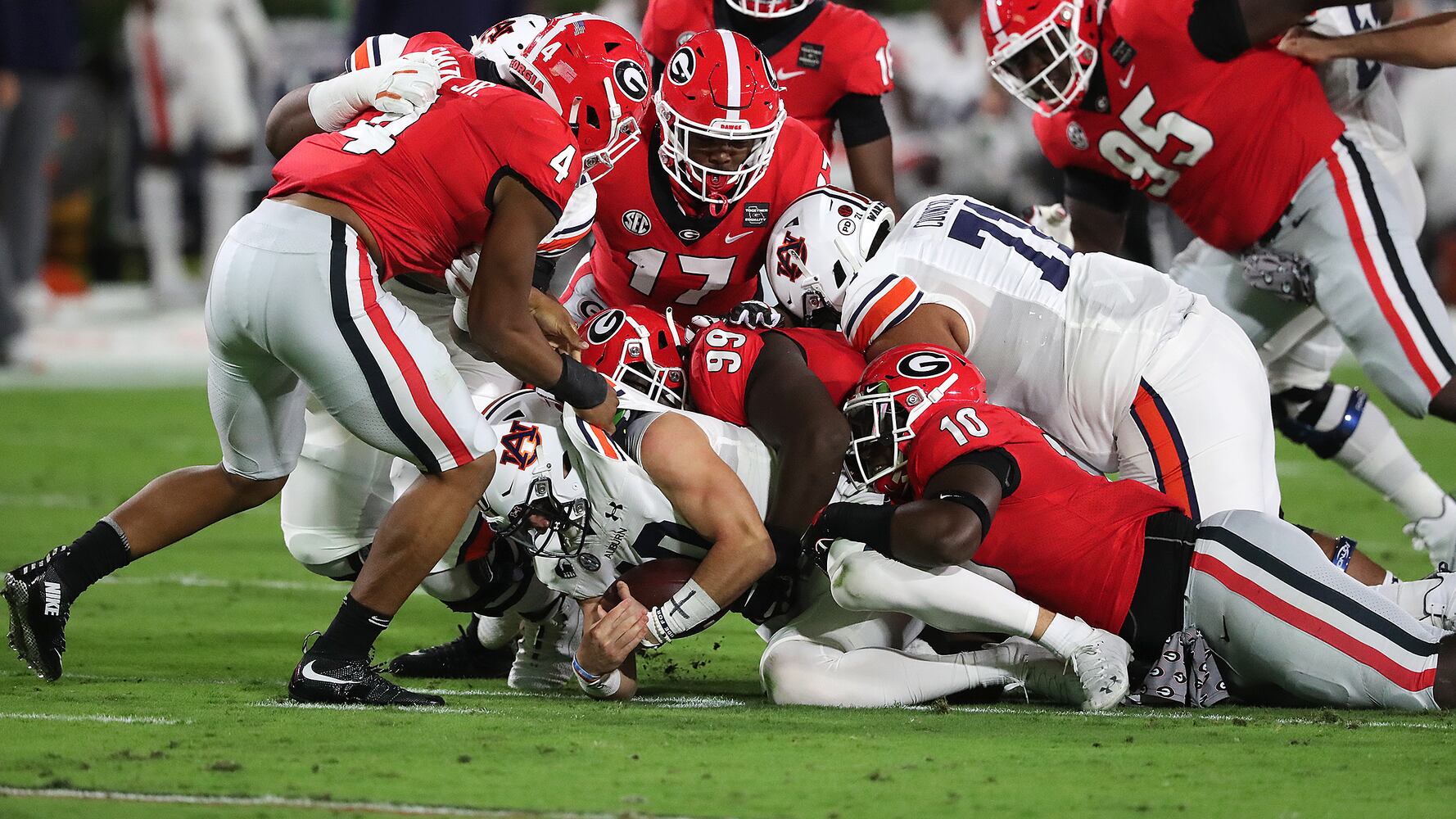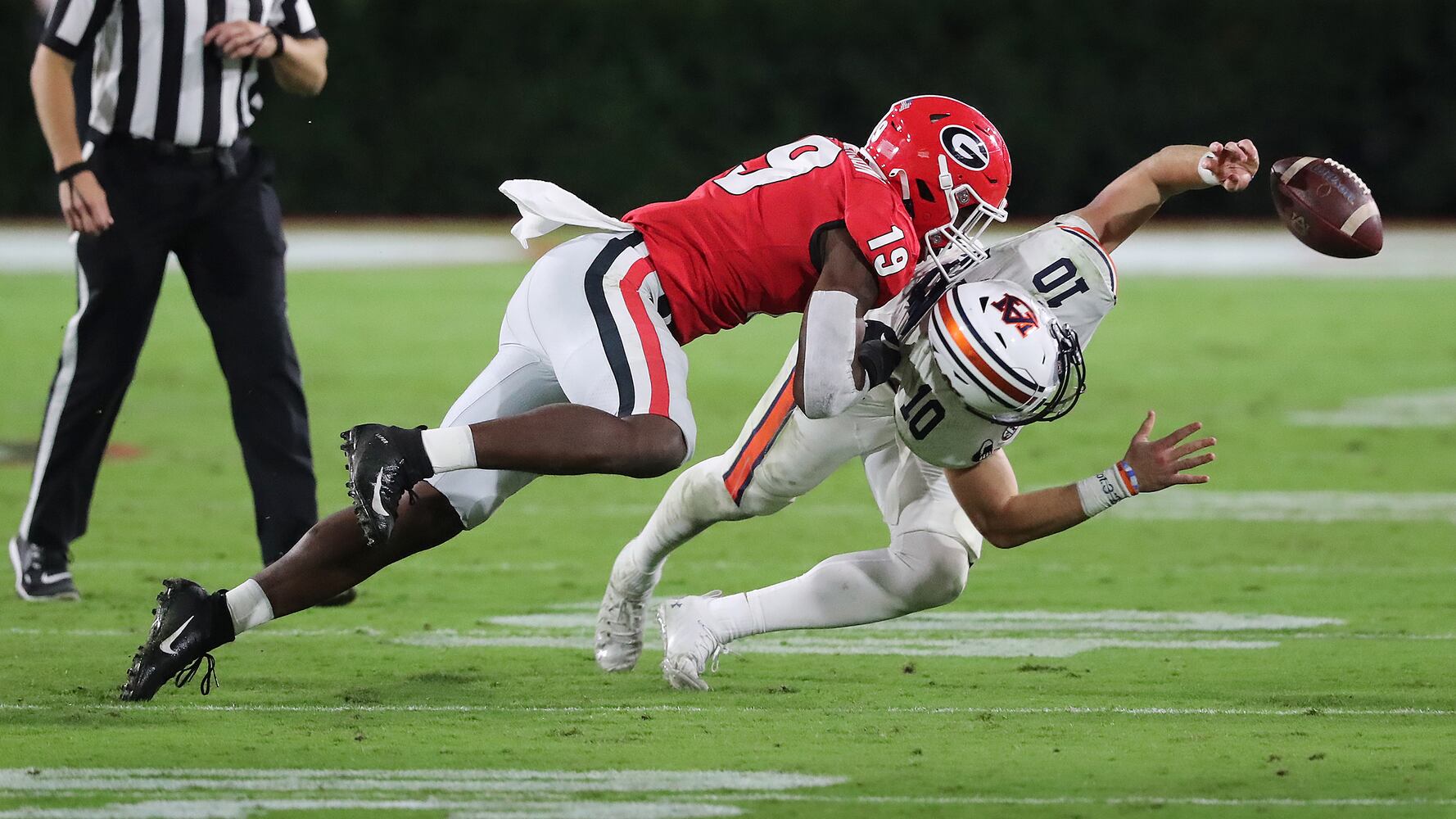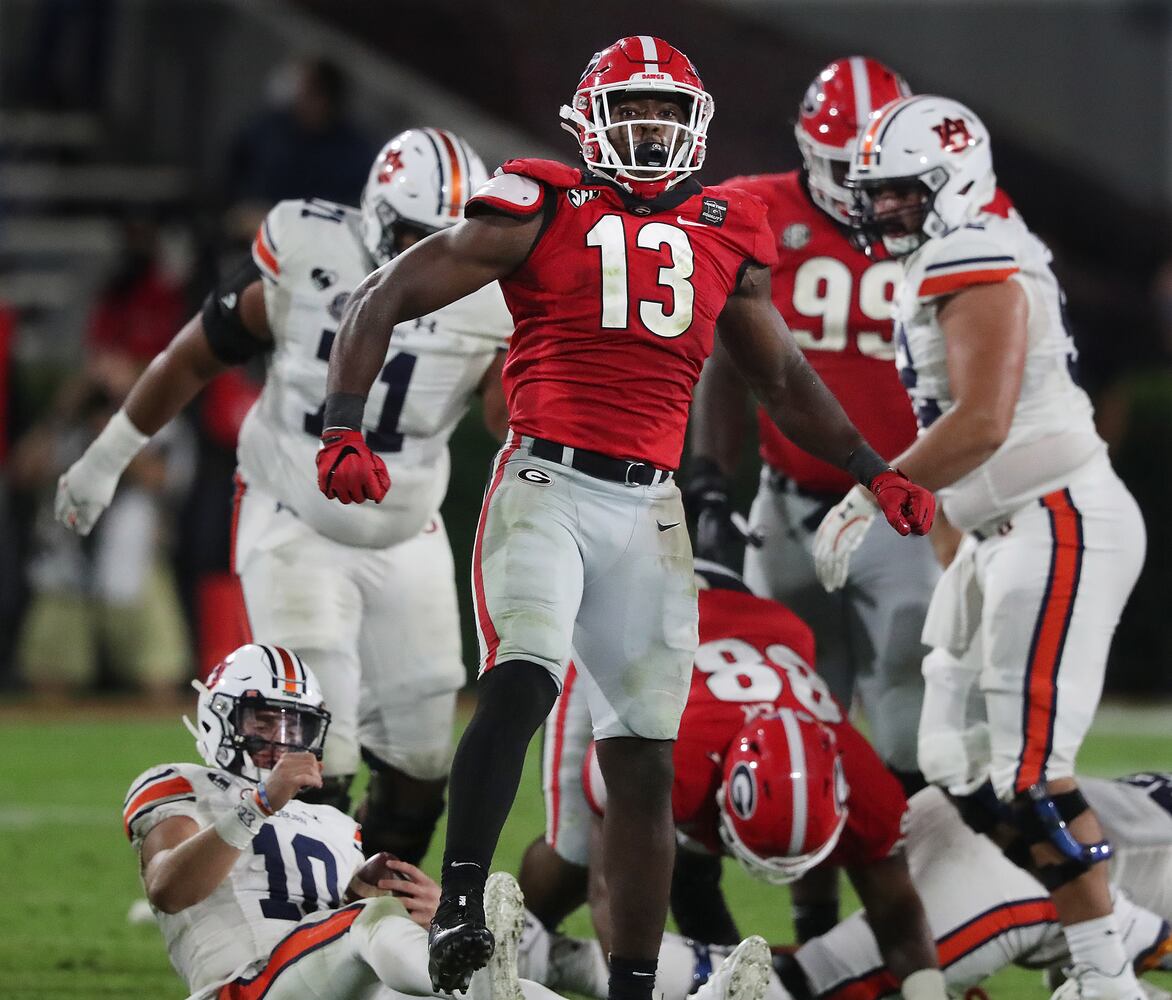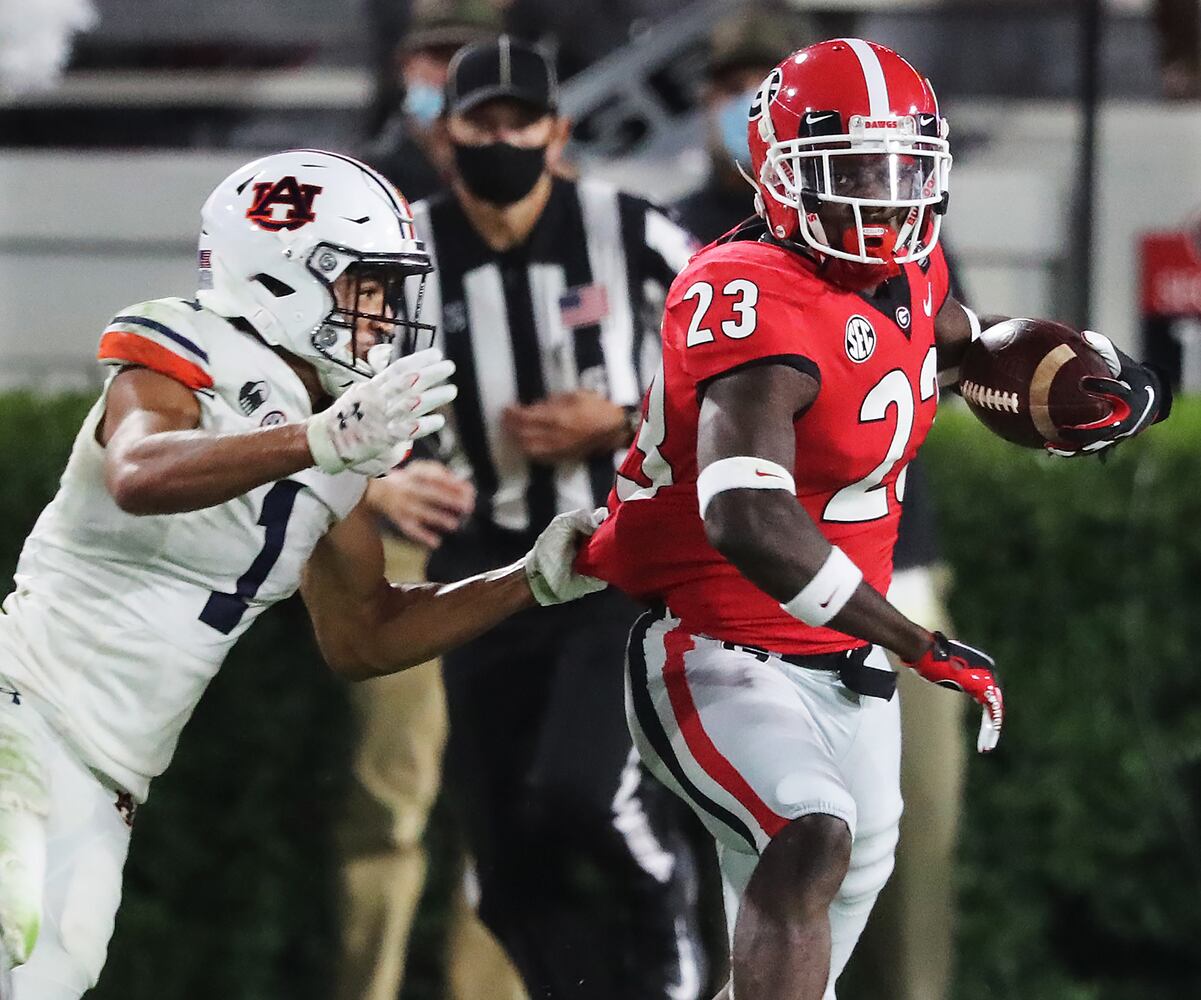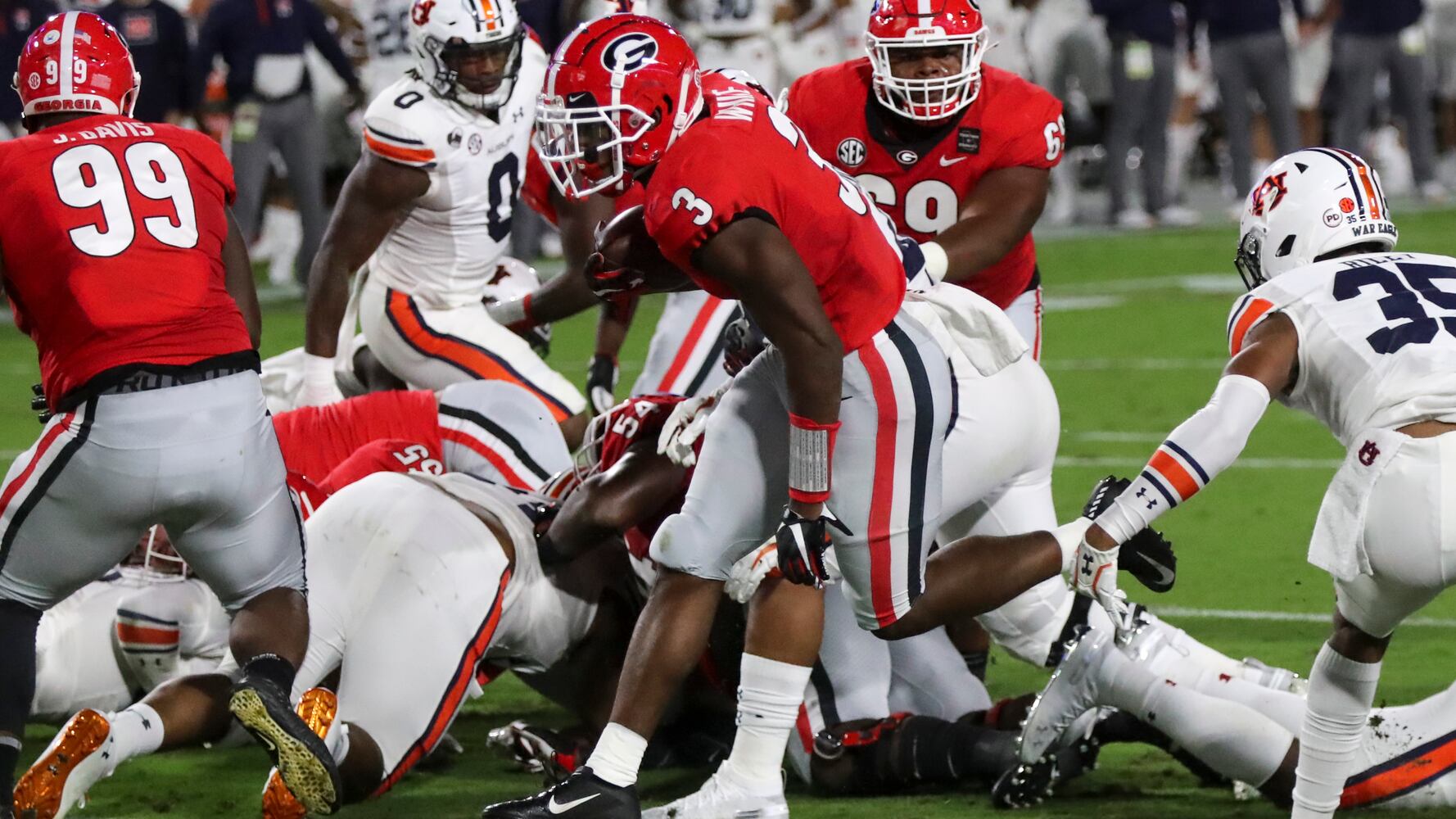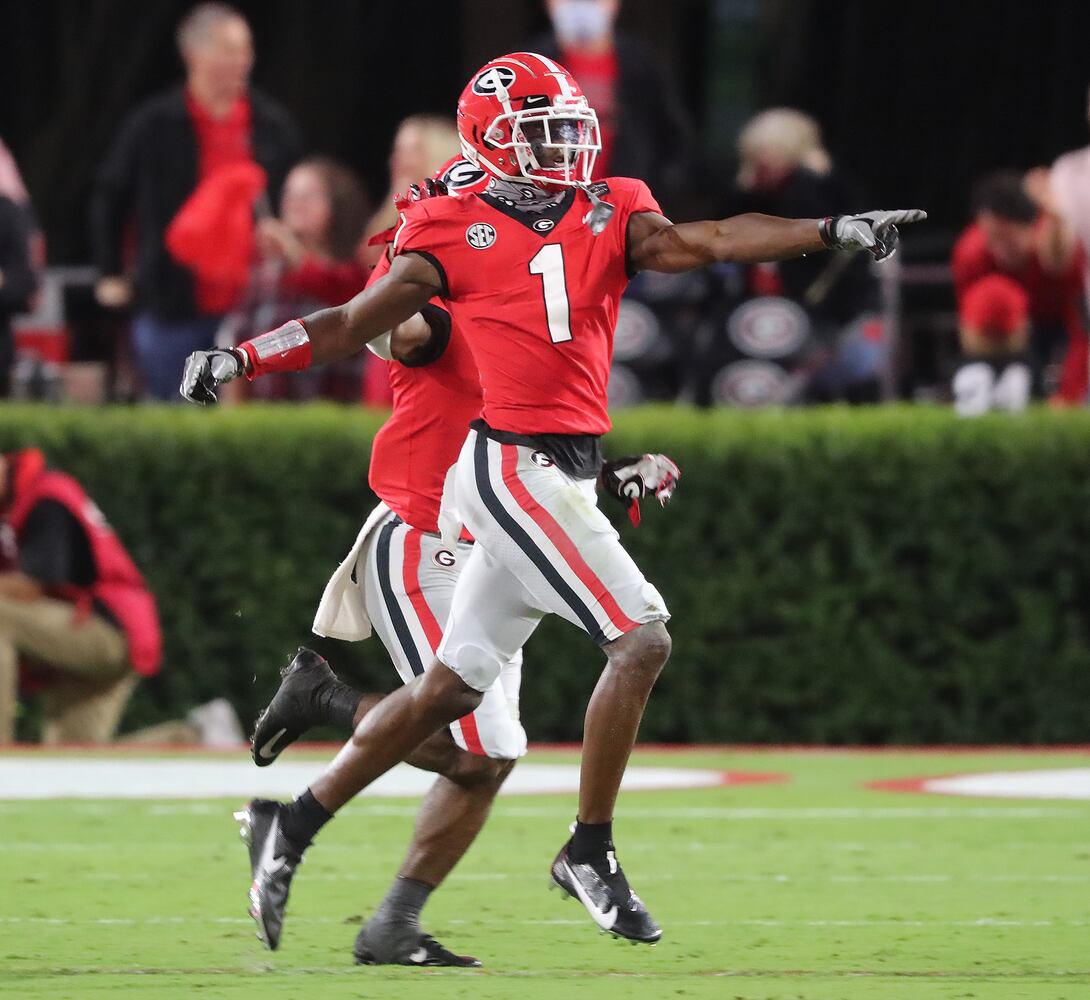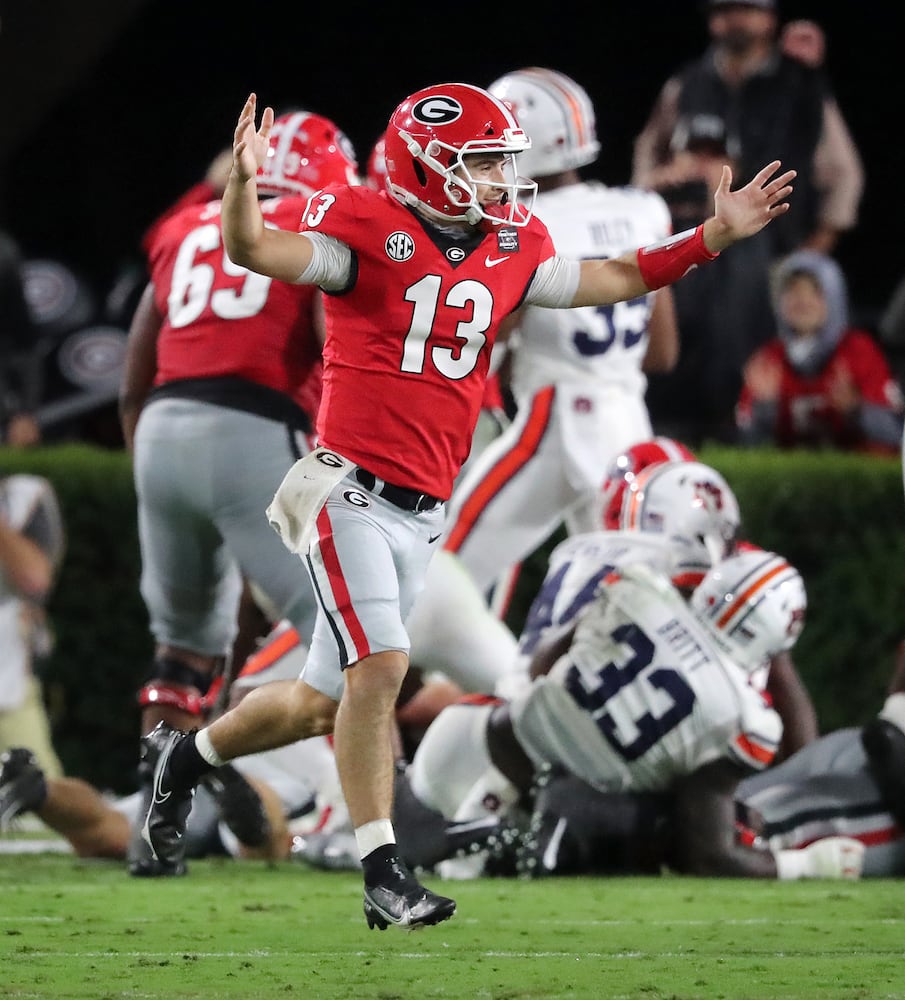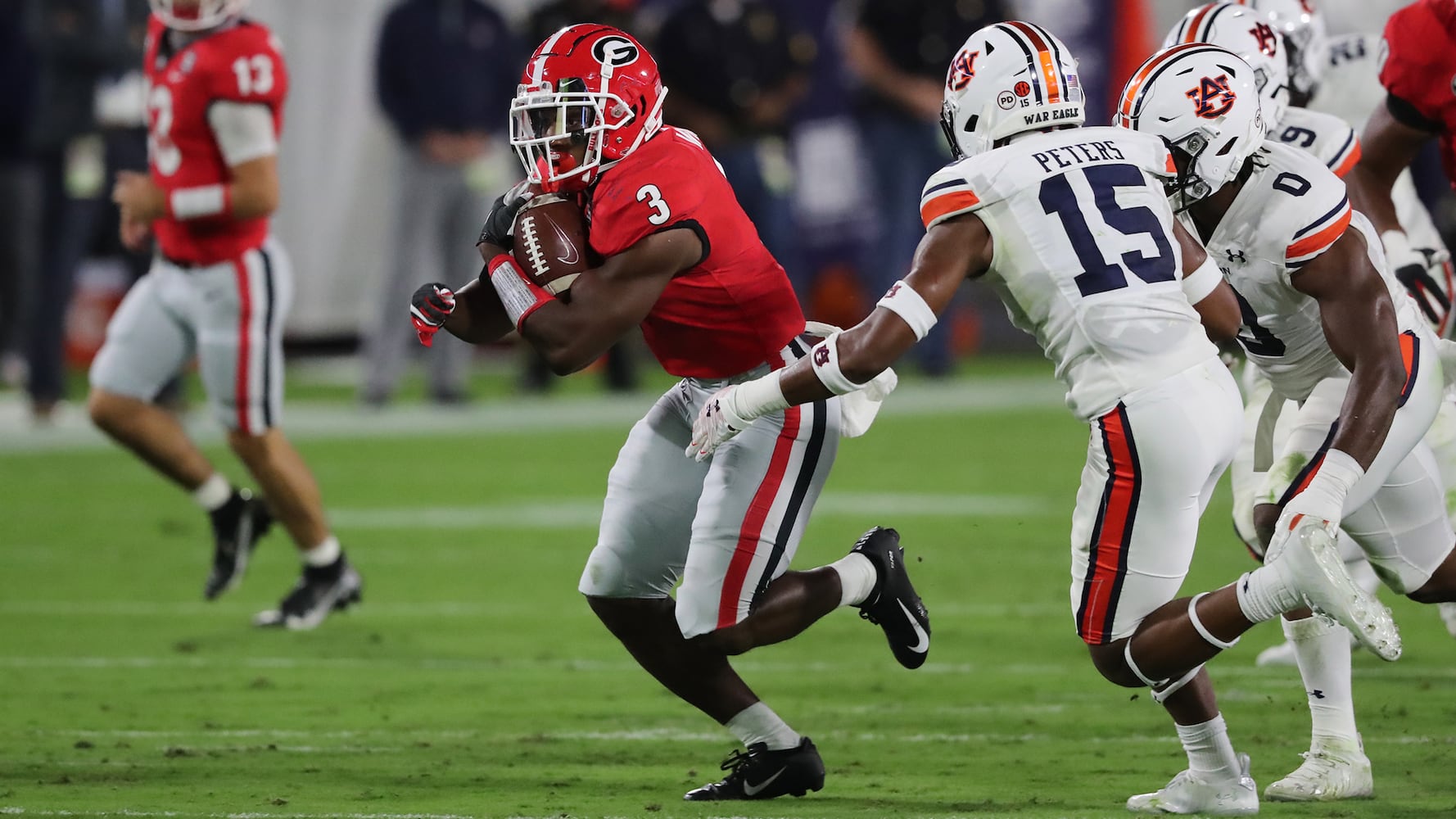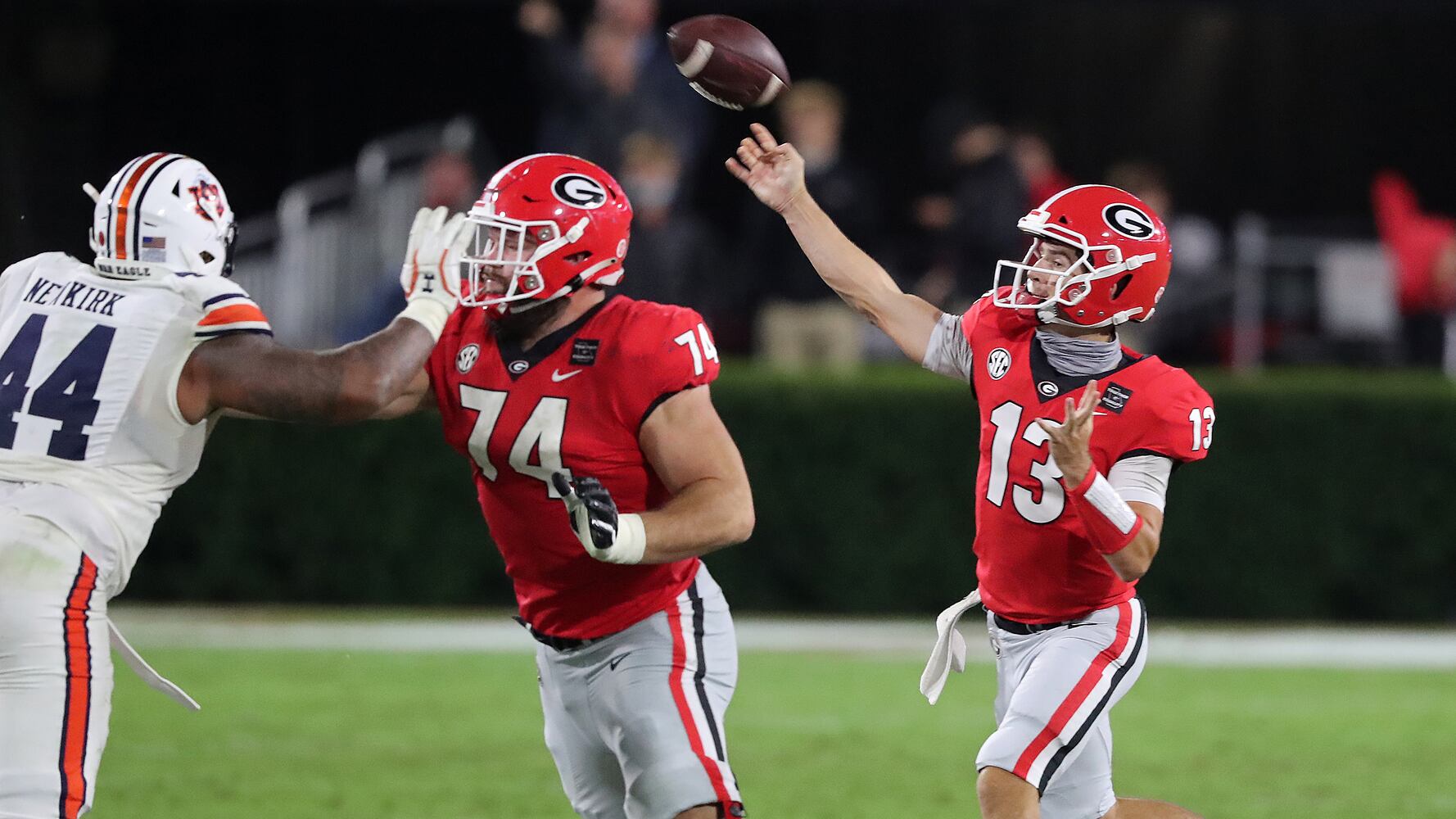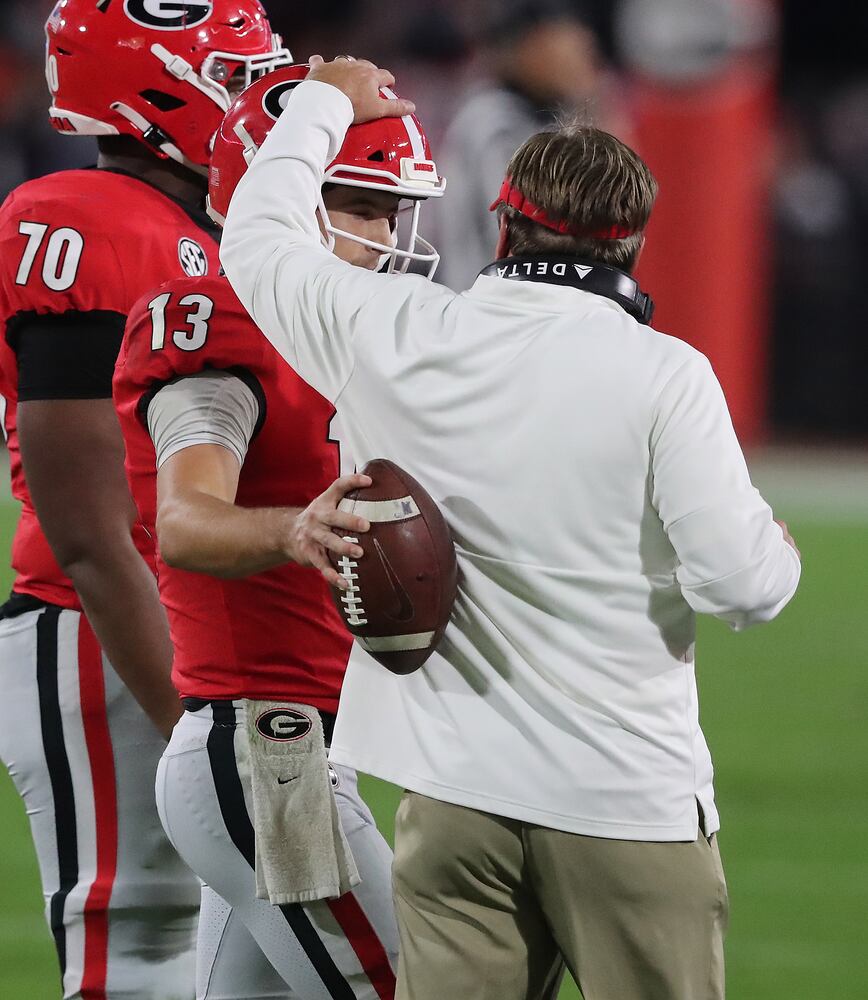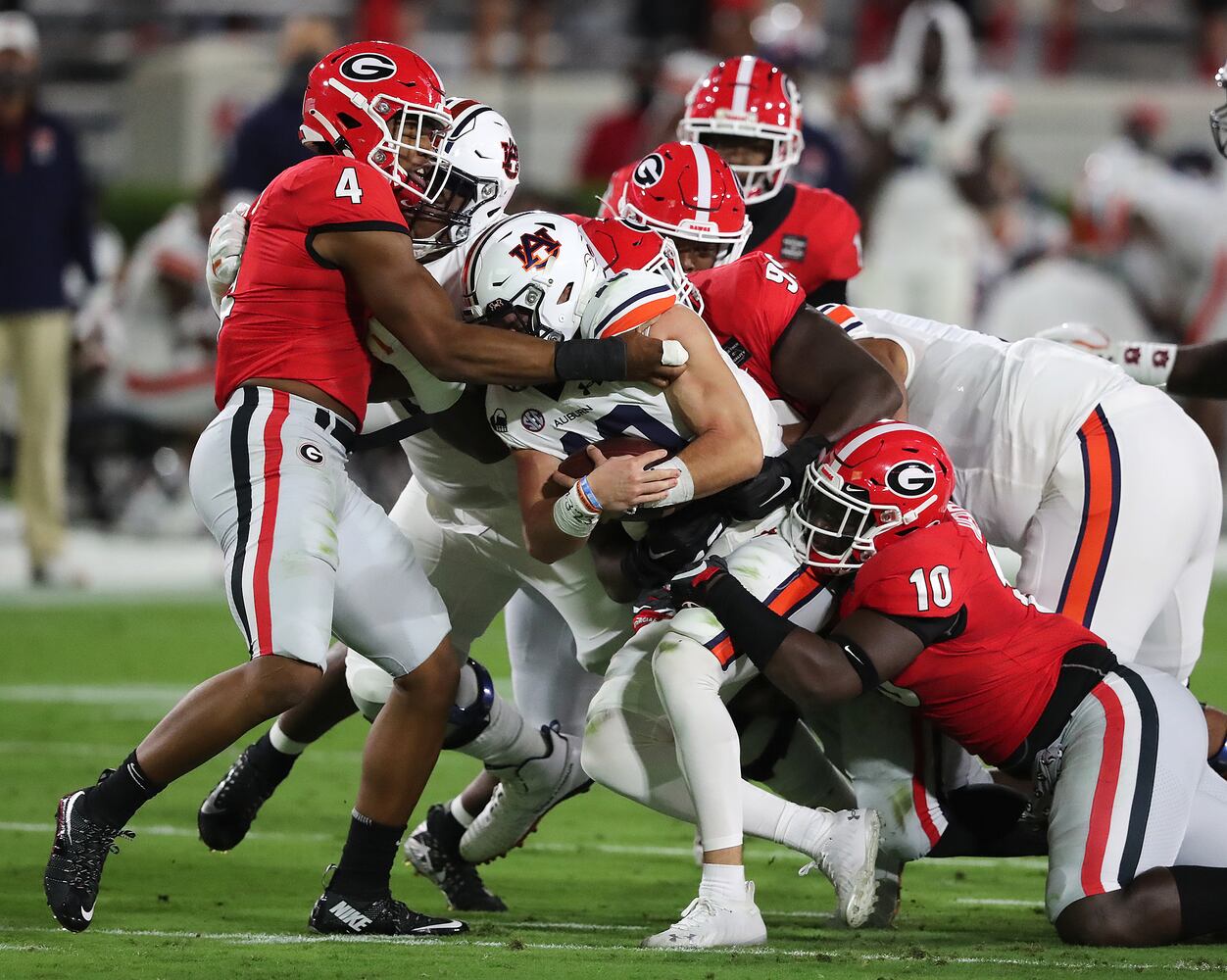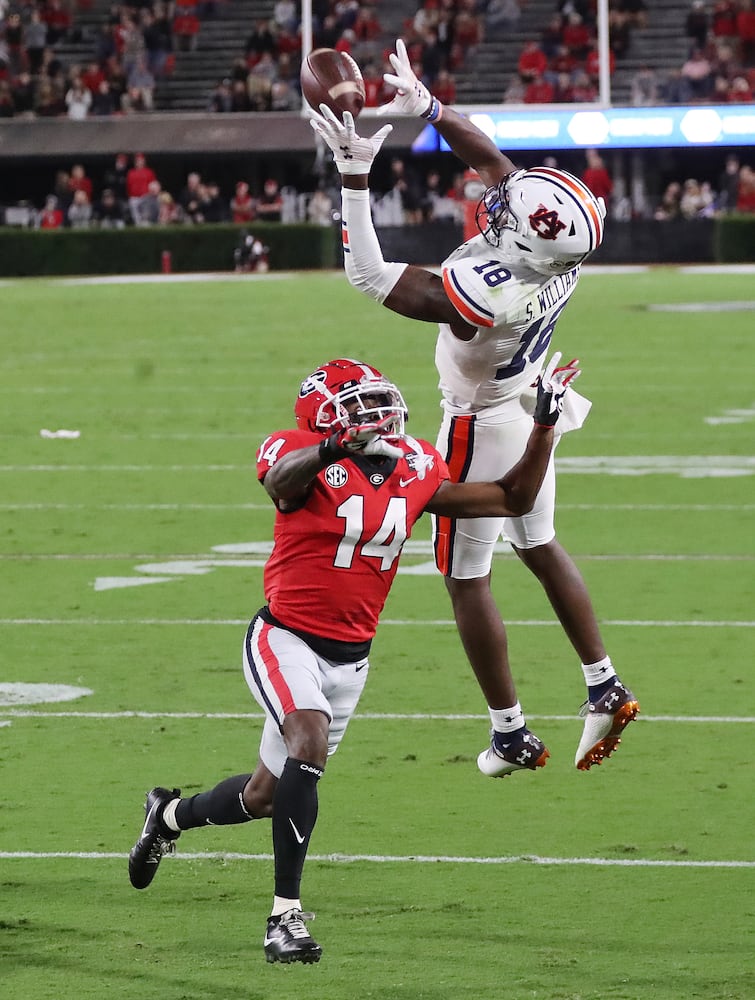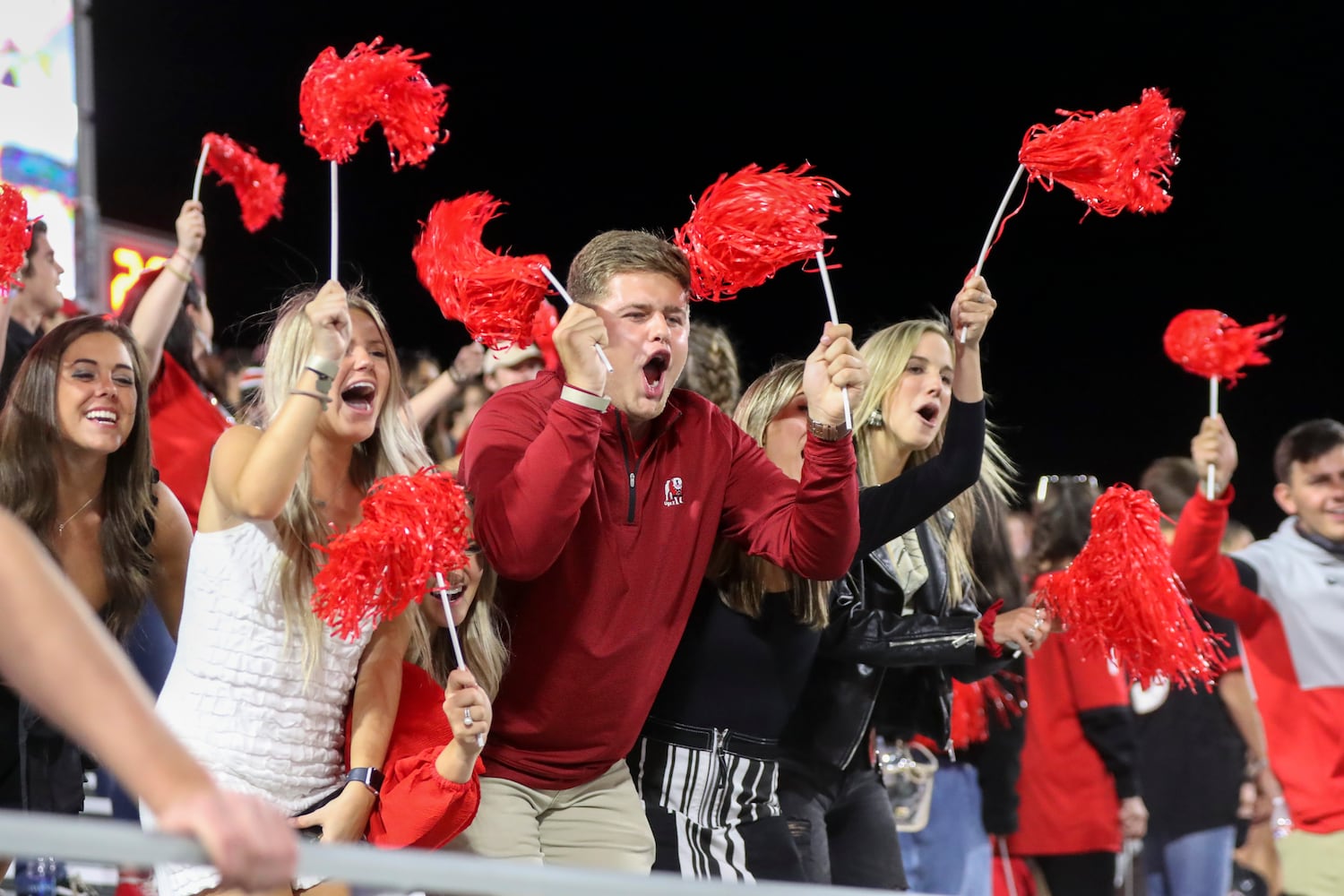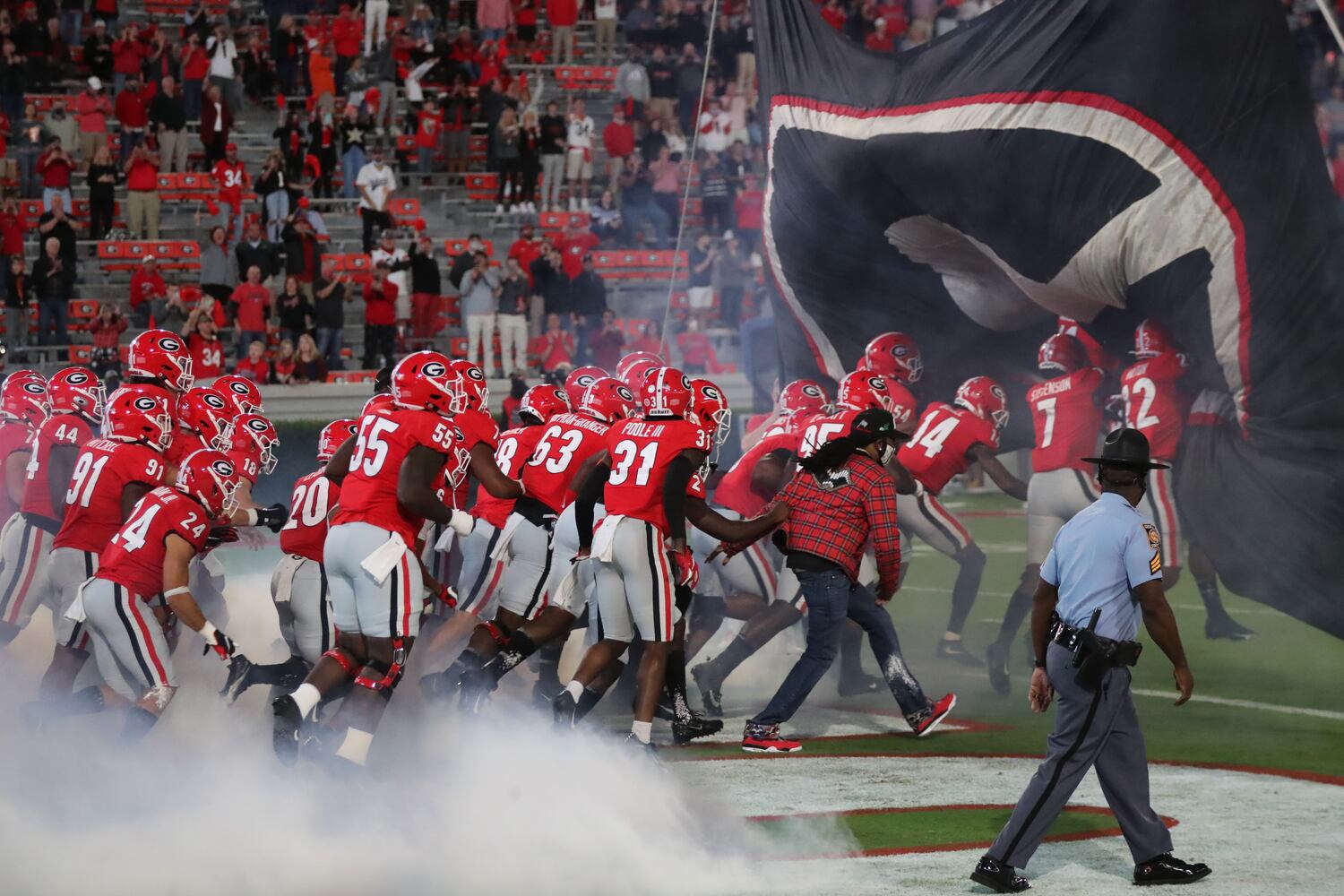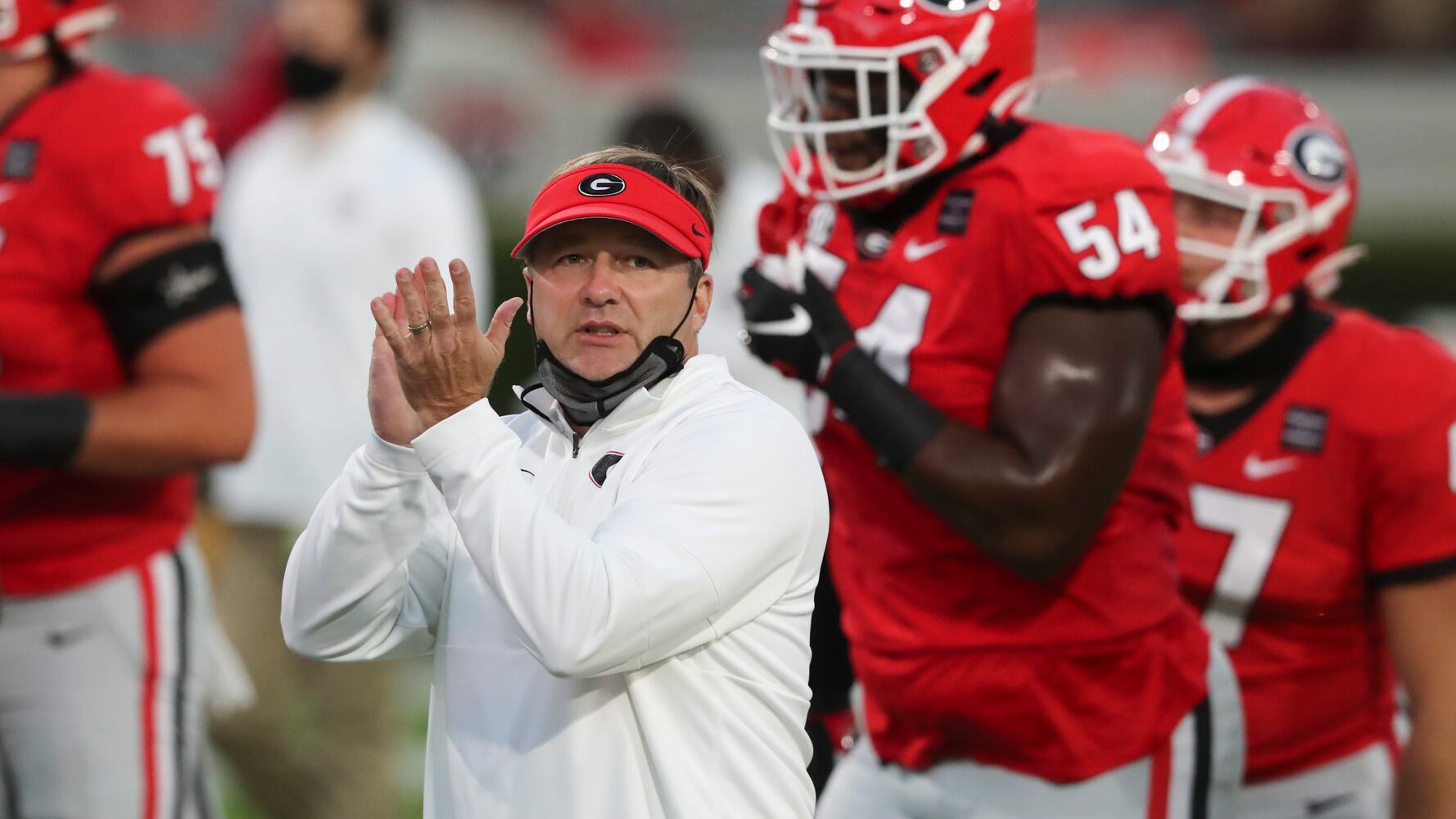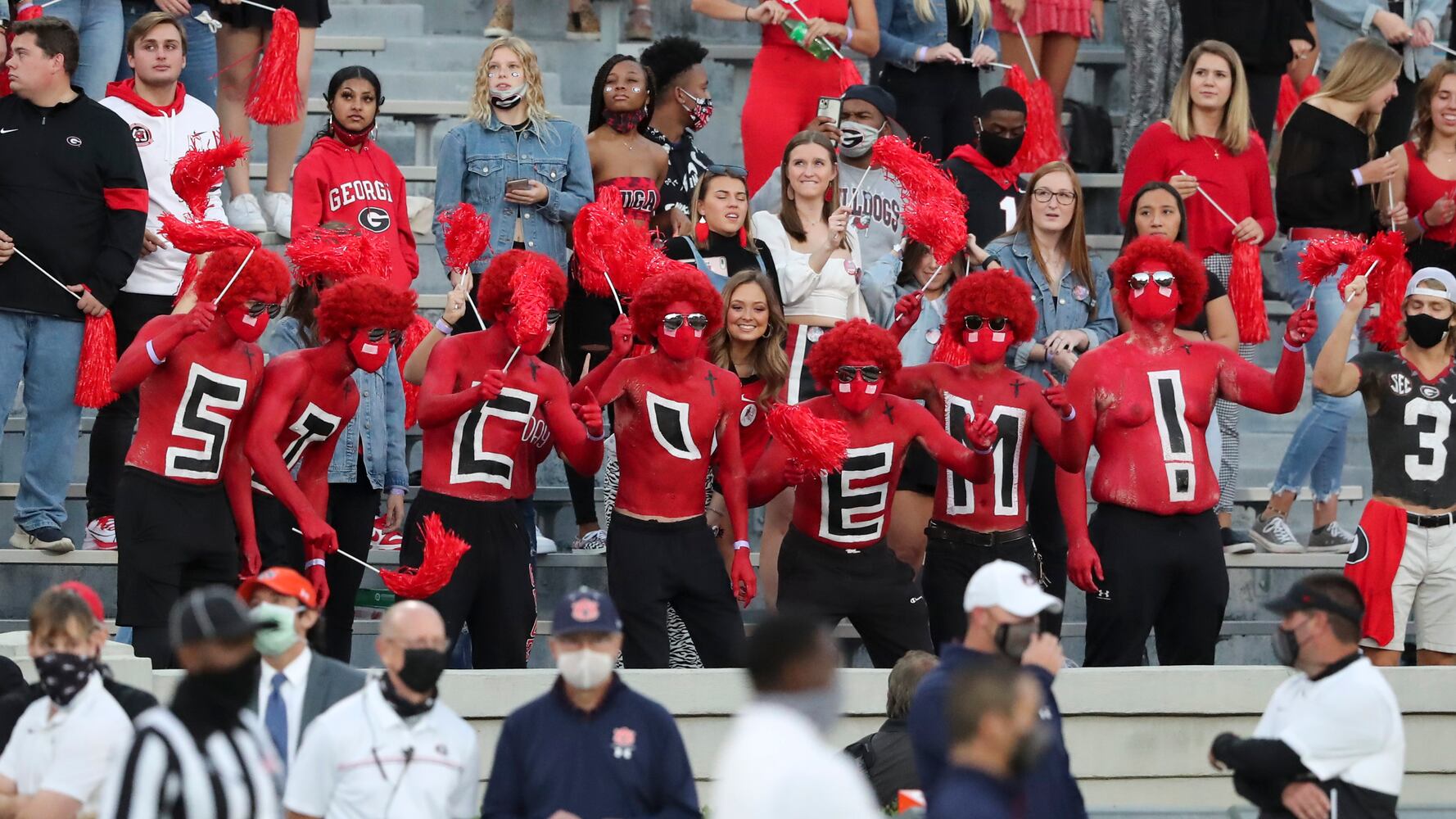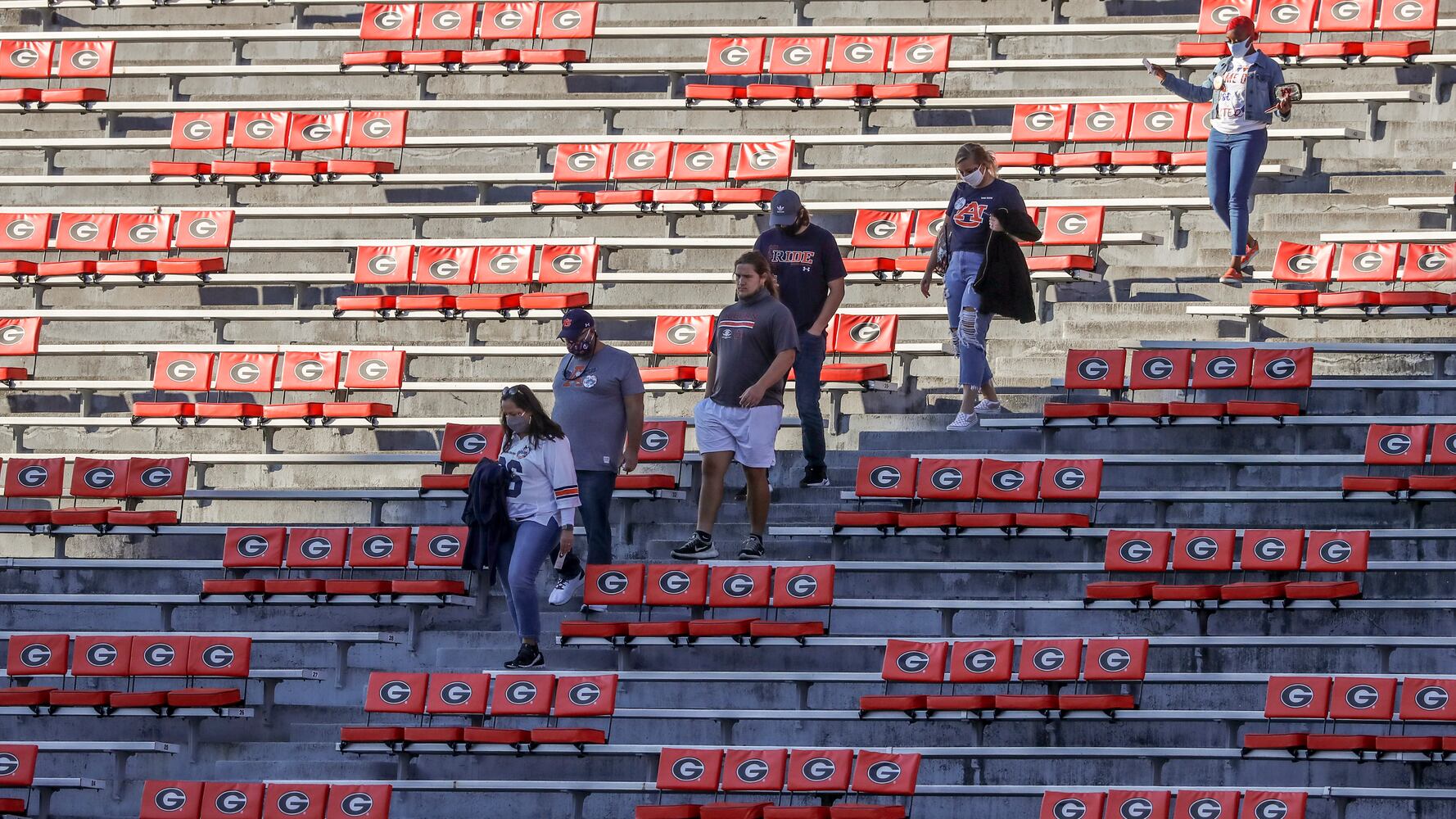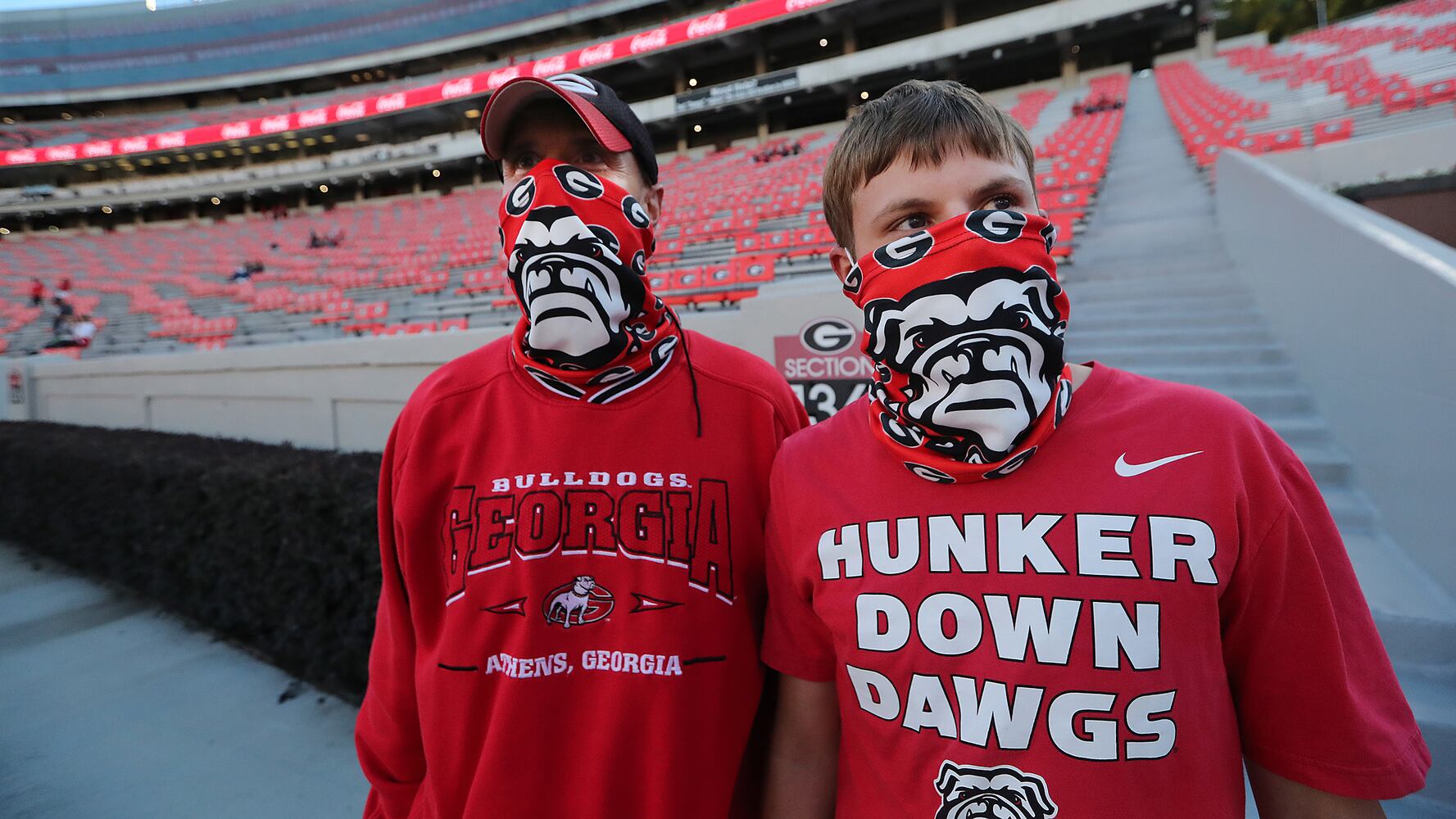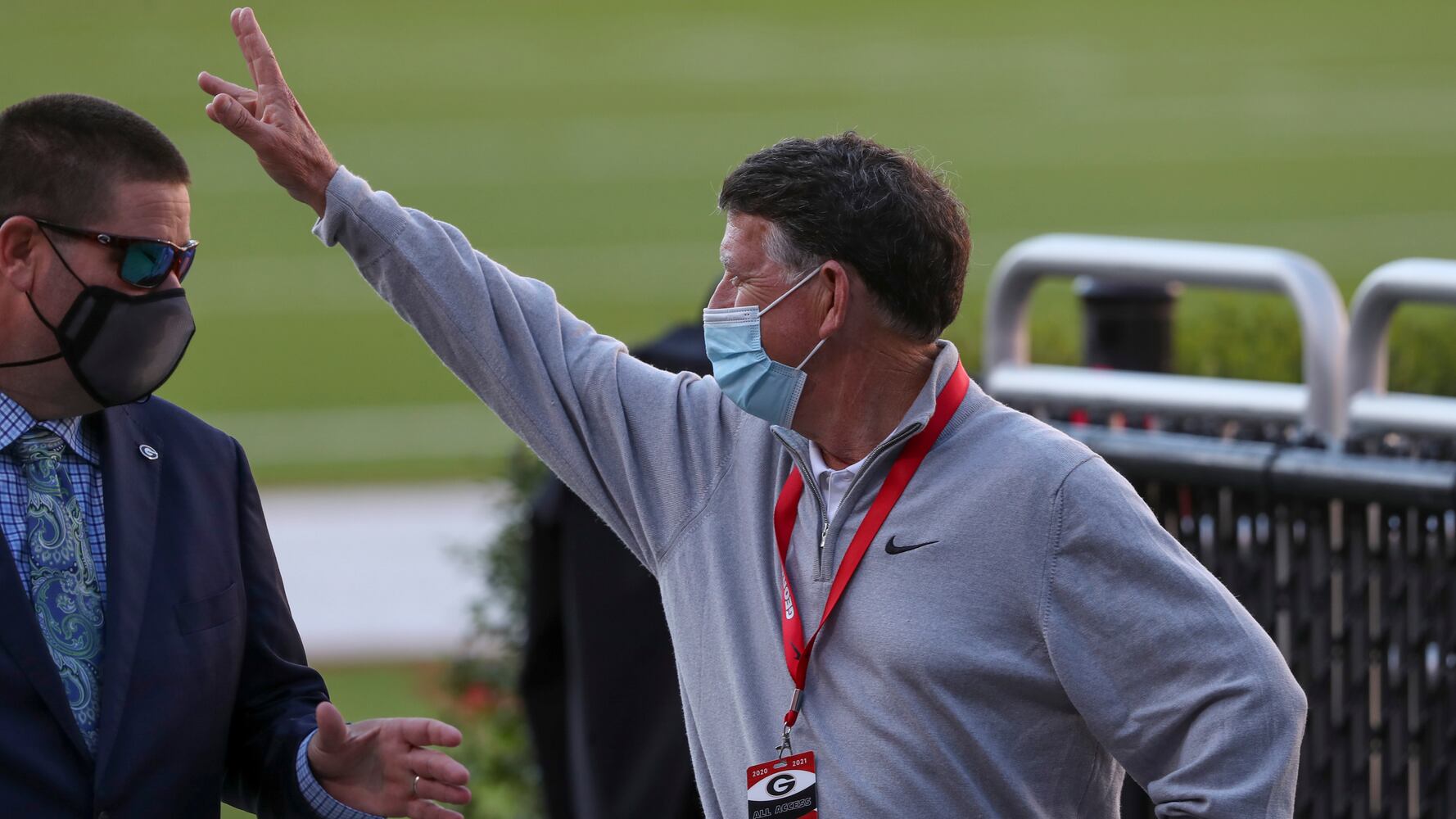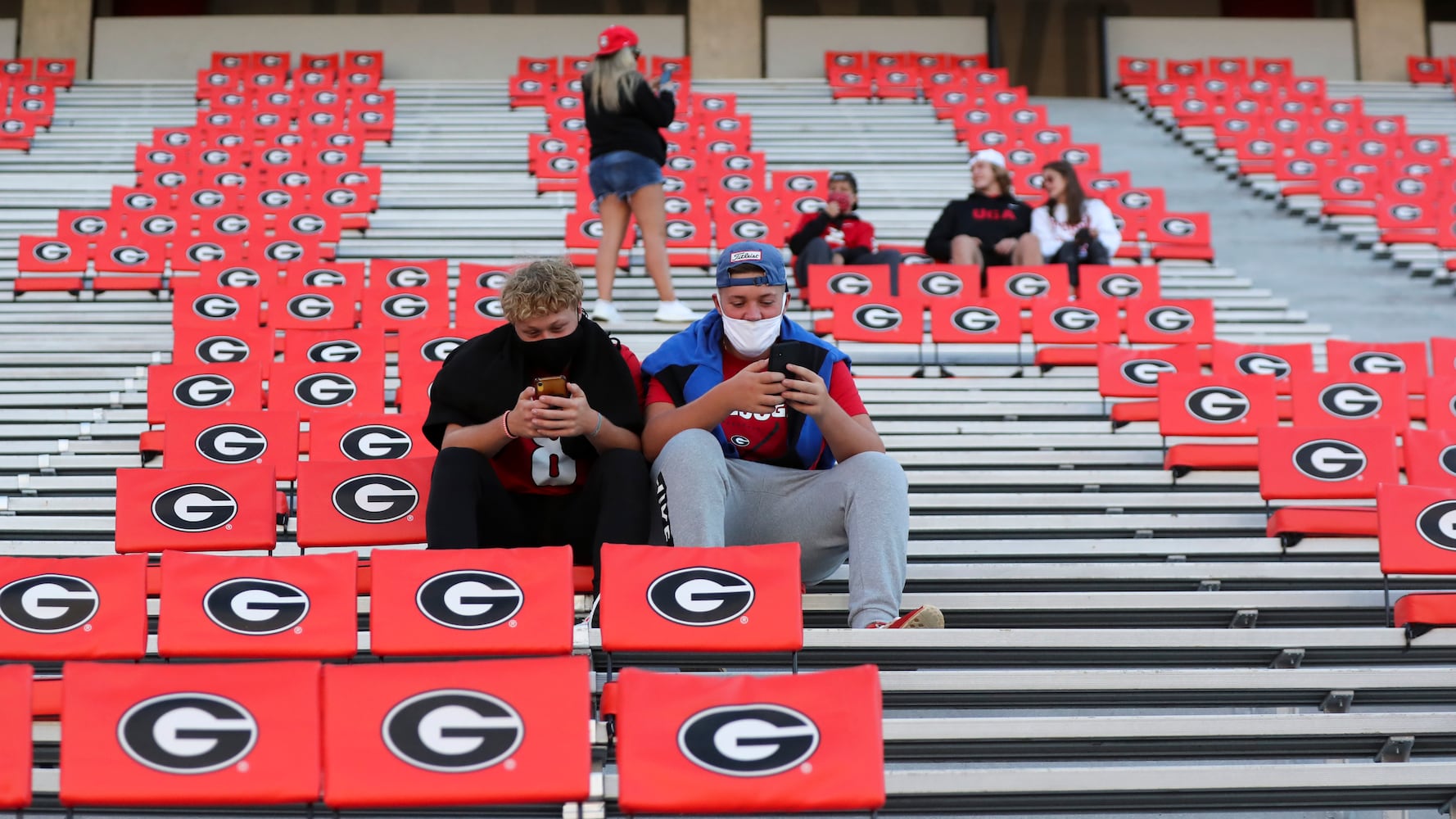ATHENS -- For decades, the fate of Georgia’s football seasons has been determined with Florida, Auburn and Georgia Tech at the end of the year. This year, it’s essentially going to be decided with Auburn, Tennessee and Alabama in the front.
Thanks to the SEC’s pandemic redo of the schedule, October is the gauntlet month for the Bulldogs. Leg 1 of that ordeal begins Saturday when No. 7 Auburn (1-0) visits Sanford Stadium for a rare early-season matchup (7:30 p.m., ESPN).
“It’s always been a big game,” said Kirby Smart, coach of the No. 4-ranked Bulldogs. “I never remember it being Game 2, that’s for sure.”
For sure, because the Deep South’s Oldest Rivalry hasn’t been played as Game 2 the first game of the 125-year-old series was played on Feb. 20, 1892. The Bulldogs played only two games that year, losing to Auburn 10-0 on a blustery, cold day in Piedmont Park (that was three weeks after thumping Mercer 50-zip in the first game in school history).
As for today, this is the first October matchup of Georgia-Auburn since 1936. This year’s game always was going to be played in October. The game was moved to Oct. 10 from its traditional place as Georgia’s final SEC game each year in the SEC’s initial schedule reshuffle that preceded the onset of the coronavirus pandemic. So, technically, this game is being played only a week earlier than scheduled.
Saturday’s game will be followed with No. 21 Tennessee on Oct. 10 in Athens and, of course, No. 2 Alabama in Tuscaloosa on Oct. 17. Those games are being played five weeks earlier and a month later, respectively, than originally scheduled for 2020.
It’s certainly a tough row to hoe. Then again, 10 conference games will be a bear for every SEC team.
“My support or disgruntle of (the schedule) doesn’t matter,” Georgia coach Kirby Smart said. “It is what it is. I don’t really care when we play, it’s who we play that I care about. We have Auburn this week.”
How Georgia ended up with such a front-loaded slate in the pandemic redo is the result of a confluence of circumstances. The bottom line is it was the SEC’s doing.
Ultimately, executive associate commissioner Mark Womack was charged with determining who played whom when the SEC decided to play a conference-only, 10-game schedule in mid-August. But he did so with some feedback from each school.
Athletic directors, knowing only that they’d be playing their original eight opponents plus two new ones from the other division, were asked to submit one primary preference for the amended schedule. In Georgia’s case, that was to play Florida in Jacksonville as close as possible to the original date with the resident bye week coming immediately before. The Gators made the same request.
“For Georgia and Florida, a game around that date was important to protect,” Georgia Athletic Director Greg McGarity said. “There was also concern about protecting intrastate rivalry games on the back end, and not on the very last weekend. … So everybody had that opportunity. Everybody had their own voice in what they’d like to preserve. I don’t know if they were all accommodated or not.”
The SEC was able to accommodate Georgia and Florida in Jacksonville, but only by moving the game a week later than its traditional Halloween weekend slot. Meanwhile, most of the other SEC teams requested that they keep their primary rival games at the end of the season.
The SEC obliged those requests as well, but on the next-to-last-Saturday instead. That was so that there would remain the possibility of a make-up game. So now you have Alabama-Auburn, Mississippi State-Ole Miss, LSU-Texas A&M and Tennessee-Vanderbilt all as Game 9 on Nov. 28. Should any of them be postponed because of COVID-19 outbreaks, they can be played on the SEC’s designated open date of Dec. 12, or the week before SEC Championship game.
The rest of the schedule was left up to the draw. Again, McGarity emphasized that the SEC exhibited no favoritism in arriving at the final product.
“There are a multitude of factors that went into it, having open dates in weeks 5, 6 and 7, couldn’t have three home games in a row, things like that,” McGarity said. “Everybody had preferences, but it was up to the conference office to make the jigsaw puzzle work.”
It will be a while before we know whether Georgia made out well. To Smart’s point, the Bulldogs simply will have to take care of business on the field. That starts with Saturday’s challenge in Auburn.
At the center of this year’s contest is Georgia’s quarterback question. The Bulldogs could well start any one of their four, but indications are the Tigers likely will see one or both of two – Stetson Bennett and D’Wan Mathis.
Bennett, a junior, came off the bench to rally Georgia to a 37-10 win Saturday at Arkansas. In doing so, the 5-foot-11, 198-pound Bennett recorded the second-best quarterback rating in the SEC and fifth best in the country, completing 22-of-29 passes for 211 yards and two touchdowns.
Bennett relieved Mathis. A 6-6, 210-pound redshirt freshman, Mathis is the most physically impressive of the Bulldogs' quarterbacks, but the offense struggled under his direction. Georgia trailed the Razorbacks, winless in the SEC since 2017, 7-0 when Bennett took over five minutes into the second quarter.
The wild card is JT Daniels. The 6-3, 210-pound sophomore transfer from Southern Cal was medically cleared for contact Monday, or about 56 weeks since he suffered a torn ACL. Daniels practiced full speed with the Bulldogs for the entirety of their preseason camp. With 12 starts and 742 live snaps with the Trojans, he’s by far the most experienced of Georgia’s options.
“He’s continuing to work and doing a great job,” Smart said. “I’m glad he’s cleared and is able to play. We’re excited to see what he does.”
That there is no clear-cut starter at quarterback for Georgia could be good or bad news for the Tigers. They’re certainly glad to be rid of Jake Fromm, who drove the Tigers bonkers with solid performances while leading the Bulldogs' to three consecutive wins. Then, again, Auburn had one game’s worth of video to study on Bennett and Mathis and nothing on Daniels under tutelage of Georgia’s first-year coordinator Todd Monken.
“We just know he’s talented; that’s probably the best way to put it,” Malzahn said of Daniels. “In a way, it’s like another first-game preparation. You’ve just got to be prepared to adjust.”
Quarterback is only one area that Georgia is having to adjust. Changes could be made on the offensive line as well as the Bulldogs struggled with basic fundamentals such as snapping the ball, committing penalties and struggling to run-block.
ESPN’s “College GameDay” and its broadcast crew no doubt will focus on the matchup of Auburn quarterback Bo Nix and his band of talented receivers against Georgia’s vaunted secondary and nationally-renown defense.
In the end, all that matters is to the Bulldogs is that they get through with a victory. This one and next week against Tennessee are half of only four games being played at Georgia’s Sanford Stadium in this COVID-19-altered season. And while home-field advantage has been significantly impacted with social distancing that limits Saturday’s crowd to 21,000, the Bulldogs certainly prefer home to the road.
And it’s still Georgia vs. Auburn.
“It’s going to be big, for sure, a top-10-matchup,” sophomore outside linebacker Azeez Ojulari said. “We’re going to be ready to play, and it’s going to be exciting for the team.”
And whatever happens, Tennessee and Bama await.
About the Author
Keep Reading
The Latest
Featured
